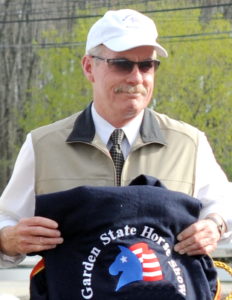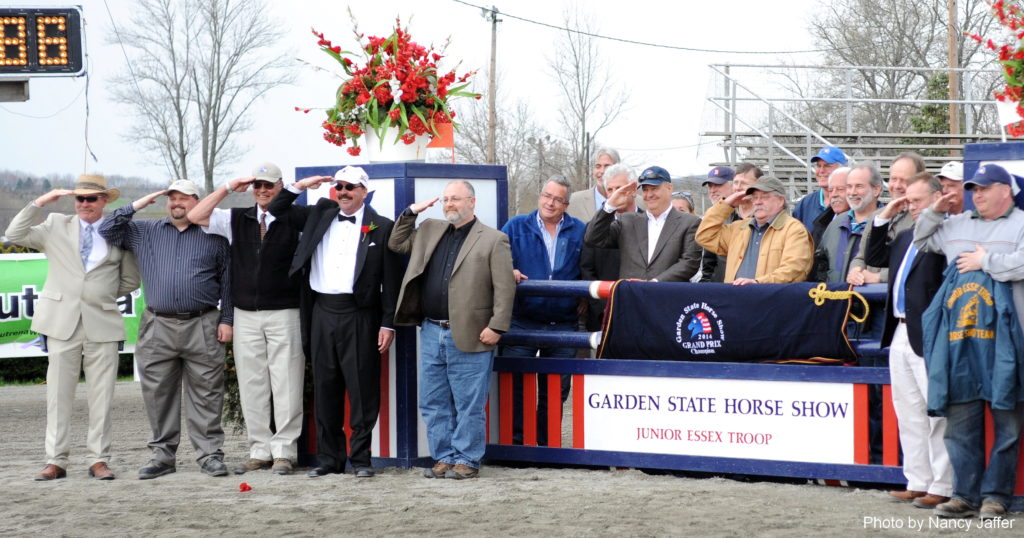By Nancy Jaffer
May 9, 2018
A horse show manager’s tenure usually is measured in terms of several years—if the person in question lasts even that long.
So it’s very unusual when someone manages a show for three decades, as Tim Cleary has with the Garden State Horse Show. But then, Garden State—which wrapped up its 68th edition last weekend—is a very unusual show.
Tim, an associate professor of equine studies at Centenary University and a lawyer to boot, is stepping down from his Garden State post.

Tim Cleary is known for his commitment to the Garden State Horse Show. (Photo by Nancy Jaffer)
“It’s the right time for somebody newer or younger to come in; it’s a good time to go. I’ll stay on the committee and certainly do everything I can for the show,” said the Hackettstown resident, 61.
Tim is a veteran of the Junior Essex Troop, which stages Garden State at the Sussex County Fairgrounds. Originally based at its own farm in West Orange, the troop was open to boys between the ages of 10 and 18 who trained in the cavalry tradition, cared for the organization’s 25 horses and maintained the stables. At its peak, troops A and C in West Orange had 120 members. Some boys, notably the late Roger Haller, who became the 1996 Olympic cross-country designer, also rode at Union County’s Watchung Stables in Troop B.
Troop was founded in 1931 by officers of the 102d Cavalry Regiment, New Jersey National Guard and incorporated in 1943 “to encourage patriotism, to foster the love of horses among boys and to train boys in horsemanship, cavalry drill, marksmanship, military training and discipline.”
The bonds that Troop’s regimen created are beyond durable; they’re unbreakable. Men who started a half-century or so ago with the organization are still incredibly close. Think “Band of Brothers” and you’ve got it.
Troop’s annual horse show—which originally gained recognition decades ago as the country’s largest competition for junior riders—has always been a spring highlight in New Jersey. In the days when it was held at the West Orange farm, indelible recollections include trying to cross the stream to get to the outside course (not every horse was eager to do that) and the drill that ended with riders in plumed helmets jumping their horses through a flaming arch.
A tragic turning point came in 1981, when the show’s manager, Jamie Griesenbeck, died in a fire a few months before the competition. Faced with “a steep learning curve” in addition to sorrow and adversity, the troopers and their advisers as usual rose to the occasion and made sure the show went on.
“We had to scramble around like crazy to figure out how to run a horse show, because we didn’t know how the mechanics worked,” said committee member Ed Jeklinksi of Cedar Knolls, noting experts in the horse show world were gracious about offering advice.
When the troop farm was sold after the 1983 show, the competition (which had become a show open to all years before) moved to Chubb Park in Chester under the direction of Rodney Seelig, the show’s chairman. It outgrew the Chester location and moved to its current home in Sussex County in 1987.
“Rodney really kept it together for such a long time,” said Brian Colquhoun, a Morris County-based veterinarian who ended his 36-year stint as one of the show’s announcers this month.
Garden State grew to be New Jersey’s largest hunter/jumper show, but bad luck with the weather and changing times have cut back on entries.
Still, the fixture has carried on with the devotion of the former troopers. The troop itself did not last beyond the late 1980s, even when it went coed. Originally, the goal of those involved with the show was to re-form the troop for a new generation with proceeds from the competition, but the era for an organization of that nature has passed into memory.
“It became clear to all of us that maybe we did hold out a little bit of a pipe dream and this generation may not be into that kind of thing,” observed Brian.
“I think that vision has started to fade in everybody’s mind a little bit. I think we see we’re never going to get troop back, but we’re bound to each other. We had so many shared experiences.”
Troopers’ families are part of the scene as well. Ed’s daughter, Lauren, met her husband, Ryan Black, when she was working at the show and he was on the jump crew. Lauren is pregnant now, and Ed notes she will be having “a troop baby.”
“It’s in your DNA,” Ed maintained.
Committee member Bill Bonstein of Chester met his wife, the former Kim Hewitt, at the show in West Orange 40 years ago when he overheard that one of her students was trying to deal with a broken martingale.
Coming to the rescue, “Bill ran to the JET barn and came back with one, saving the day. And that was our beginning together,” said Kim.
Tim, who had served as the director of horsemanship at the West Orange farm, was a natural choice to be Garden State’s manager.
“It was like he was born to run the show,” mused Bill.
“He knows everybody and doesn’t walk 10 feet without someone grabbing his sleeve.”
Ed, who joined Troop at age 10 and is now 63, noted, “it’s just amazing how much time Tim puts into it before the show even starts. I’d get there by 7 a.m., and Tim was always there before me.” Their day didn’t end until 7 or 8 p.m. through the run of the five-day show, as well as the two-day preview show the previous weekend.
Part of the key to Tim’s success, apart from knowing everyone’s name and being very fair, “is his patience and understanding. He listens,” said Ed.
Brian, who knew Tim from their days as troopers, pointed out, “Our best and oldest friends are all troop guys. Maybe it was the shared experiences during a very formative time in our lives. It was a unique organization, and one for which we were in the right time and place.”

Tim Cleary (left) and others involved with the Garden State Show share a salute reminiscent of the Junior Essex Troop Days. (Photo by Nancy Jaffer)
Tim joined Troop in 1957 and rose through the ranks, leaving as major in 1975. That honor even landed him on the old quiz show, “To Tell the Truth.”
As he thought back on what made Troop such a lasting experience for so many, Tim explained, “The horses were the bond. We all loved horses and we were learning great old cavalry skills on how to take care of horses.
“The military framework taught you leadership. As you acquired a new rank, you became another level of a leader and became in charge of people. It taught lot of responsibility, not only for the horses, but also, you became responsible for each other, too.”
When he was director of horsemanship, Tim said, former troopers started coming back to run the show “in the spirit of what we had learned. It’s not about the money, it’s trying to be service-oriented and give people a good show.”
The show donates to charity, with Centenary a beneficiary in terms of scholarships.
Brian noted how much things have changed in the show world, and Garden State has “felt the pressure, with all the extra time in Wellington, when Tryon opened up, people going to Kentucky.”
There was a day, Bill pointed out, when the upper level of the New Jersey show scene was basically just Garden State, Middlesex (now at the Horse Park of New Jersey in Monmouth County), the Sussex Farm and Horse Show and Monmouth (now in Somerset County at the U.S. Equestrian Team Foundation.) Other big shows have developed since in the state, including the Princeton series in Somerset County and The Ridge in Warren County, while HITS in nearby Saugerties, N.Y., has also become a stop on the circuit.
The Garden State committee will come up with a new manager, whether it’s someone from within or an outsider, said Tim, and together, members will chart what’s ahead for the show.
There has been some discussion of packing it in and turning it over to another non-profit, but Tim believes, “I think that’s pretty far off in the future. There’s still a pretty active committee that enjoys it.”
And for many of the riders who come back every year, it’s a treasured tradition.



